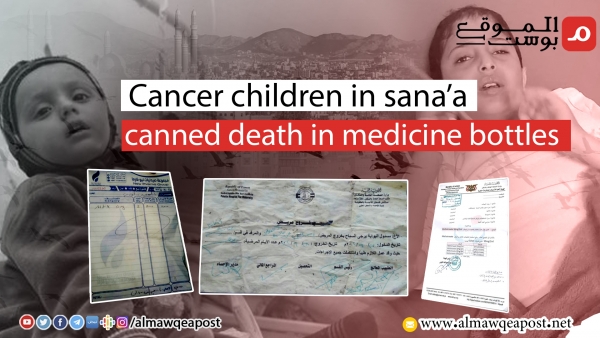
[ [The Cancer Patients Shook all Yemen] ]
Among the contents of the investigation:
Victims’ families gave shocking testimonies of their children’s suffering after receiving the deadly doses of Methotrexate medicine.
Ministry of Health distributed patients to several hospitals in order to avoid any possible unified reaction towards what all children were exposed to.
The Ministry of Health in Sana'a imposed a blackout on the case and prevented parents from filing a lawsuit.
A medical official at Kuwait Hospital said that the drug had run out in stores, and patients were asked to buy it from pharmacies.
Hospitals refused to give victims' families reports on the causes of their children's deaths and were satisfied to provide burial permits.
The Supreme Authority for Medicines warned twenty days before the drug used and did not take any field measures.
The Physicians and Pharmacists Syndicate held the Supreme Authority for Medicines the responsibility and accused it of trading and violating the law.
Information revealing the dealings of the Ministry of Health in Sana’a with organizations, traders of smuggled drugs, and a corruption lobby.
The Syndicate of Pharmacies Owners accuses government agencies in Sana'a of holding pharmacies owners and evading of responsibility.
A spokesman for the Ministry of Health revealed the absence of a pharmaceutical agent for the company producing the medicine category used in Yemen.
Extensive information about the medicine used, the manufacturer and the international warnings about its use and storage.
The family of the child Ismail Muhammed Al-Khoulani (11 years old) left her home, heading to the Kuwait Governmental Hospital, to obtain a dose of the chemical medicine for her son who had been diagnosed with cancer five years ago. After moments of receiving that dose and leaving the hospital building, the family returned from the middle of the road to the hospital, did not know that this return would be the last, with the child alive.
An expired dose was given to the child at the hospital had caused his death within a few hours, after signs of recovery appeared on him, with the use of regular doses within five years. He had only two doses left until he fully recovered from the disease, according to the doctor who monitors his health condition.
This sad scene suffered by the family of the child Khawlani, occurred in the capital of Sana’a, was repeated with several families, in the most horrific crime that shook Yemen. About 34 children were infected, ten of whom died, and 24 others are still under intensive care rooms, until writing this article.
Almawqea Post has investigated what happened, met the families of the victims, and contacted specialists, doctors, academics, and several parties, searching for answers about what exactly happened, and how the drug turned into a deadly disease.
Complications and blackouts
The father of the child, Ismail Muhammed Al-Khoulani, tells the details of the last moments of his son’s life with the lethal injection received in Kuwait Hospital. He explained to Al-Mawqea Post that he took his child to the hospital to give him the prescribed dose, and after finishing they left home. On their way back, the child had complications that never seen before. We contacted the doctor, and she told us to give him the medicine, take him to the nearest health centre. After taking him there his condition did not improve, but rather worsened, and when we contacted her again she asked us to bring him immediately, and informed us that the dose that was taken has been expired.
He continues his words of sorrow and heartbreak, "When we arrived at Kuwait Hospital, they entered the child under the intensive care. After six hours, they asked us to transfer him to Palestine Hospital, and there he was also entered under the intensive care. It was only twenty-four hours, when Ismail got died, while Palestine Hospital issued only an exit permit, and did not provide a report that indicates the cause of death or what it refers to.” This is what the document obtained by Almawqea Post shows, revealing that the child was entered to the hospital on the 27th of last September, and deadly left it on the following day, the 28th of the same month.
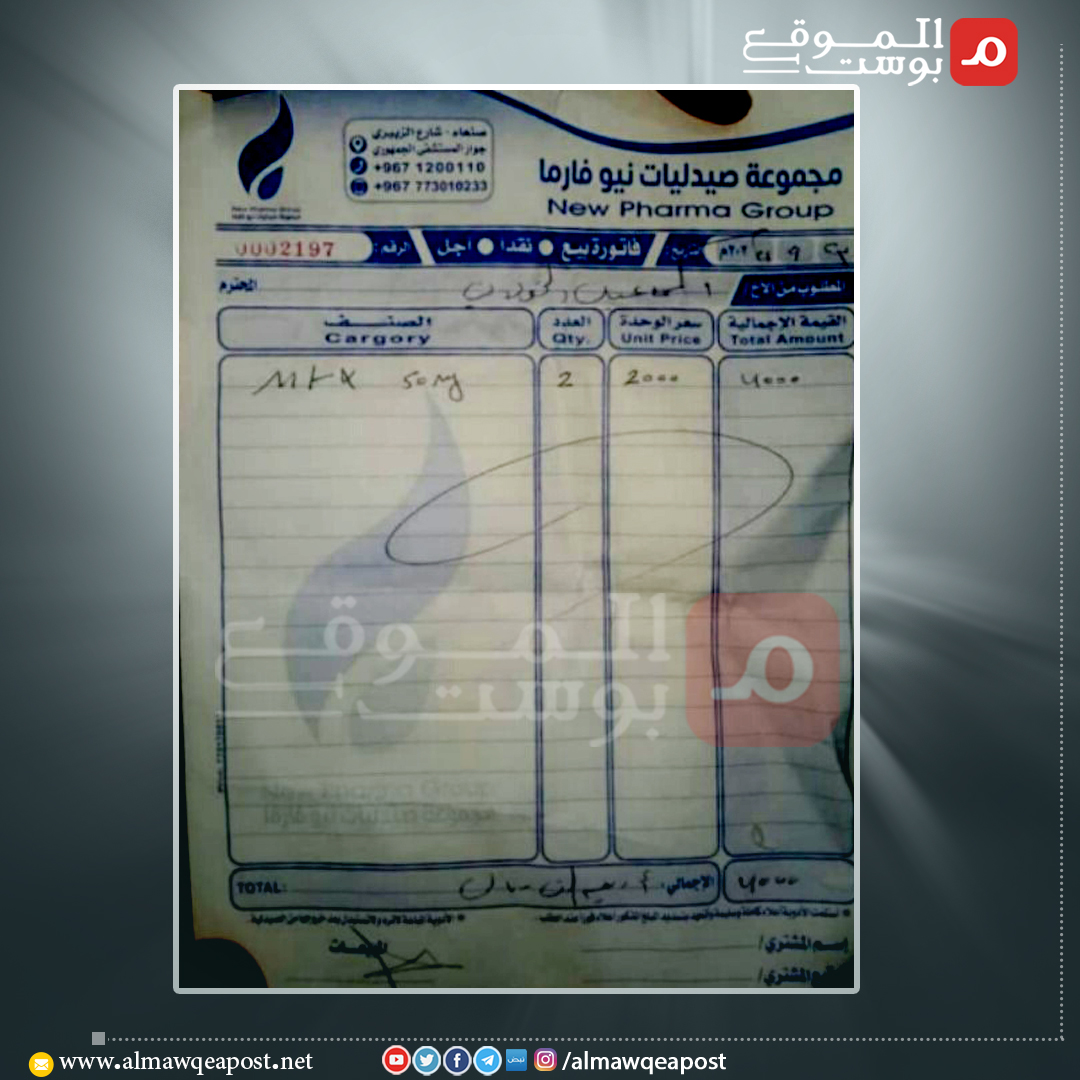
[A prescription to buy the medicine from a pharmacy at Sana'a]
“We used to see the children who were injected with “Methotrexate” medicine during the date 24-25 of September, which “Ismail” was injected at. After the number got increased, the hospital administration decided to transfer each patient to a different hospital, in order to avoid reactions from parents, so that every parent does not know the fate and consequences of what others have been through”. Al-Khawlani said, describing what happened at that time.
Al-Khawlani says that many of the victims’ parents went to the headquarter of the Ministry of Health in the capital of Sana’a, to file a case against the responsible parties, and demanded an investigation with those involved. They met the director of the Minister of Health’s office, and were prevented from filing any case. They were also promised by the Ministry authorities to do the needful, asking them to go home, while they will take care of that.
What is making the suspicions double, opening the door to mistrust further, was what Al-Khulani revealed that the director of the Minister of Health’s office avoided talking to the victims’ parents collectively, conducting individual interviews with each father separately, so that they did not get to know each other.
Unexpected Death
The parents brought their children to the Kuwait Governmental Hospital in search of recovery, and in the hope that life would return to the bodies of their sick bodies, but death was waiting for them, dwelling inside the boxes of medicines that were provided with. They had lived the details of pain along with their kids alive, and the moments of loss and separation as they pop off life forever.
Among the cases that we, at Almawqea Post, reached to, is the father of one of the victims, called "Abdullah Saeed", whose daughter Shaima died as a result of using the same medicine. He said that his daughter was fine, and her condition got improved very recently, listing the details of that fateful day. He added that he went to the hospital as it was scheduled to receive the chemotherapy assigned to her, and when he arrived at the hospital in the morning. The dose was given to his child, and the hospital staff did not ask him to wait to monitor the child’s health condition after taking the medicine, as usual practice after each dose.
"They allowed us to leave, and shortly after that, symptoms and complications began to appear on my daughter, including headaches, stomach pain, vomiting, and severe brain pain. By noticing these symptoms, we returned to the hospital immediately, and the girl was entered to the intensive care. She remained there for four days, before passing away”, he continued.
"All of that was mainly caused by the medicine given to the girl, and yet they never gave me any report stating the cause of death, and they gave me a discharge permit and closed the case”, he added.
With a painful heartburn, Shaima's father continues his talk, saying that after the burial, he went to the hospital to ask them about the cause of death, they told him that the reason was that the girl had taken a dose of expired and spoiled medicine, and that they bought that dose from one of the pharmacies next to the hospital.
The father pointed out that he did not purchase the medicine from outside, but rather it was dispensed from inside the hospital, and that the hospital informed him that they had bought that dose the day before his daughter was entered to the hospital and was given to her the next day. He also cited the words of his counterparts accompanying the patients, that the doses given to patients in that day which was a surplus of medicine used for other patients the day before, and it was purchased from a pharmacy next door to the hospital called "Pharma Pharmacy".
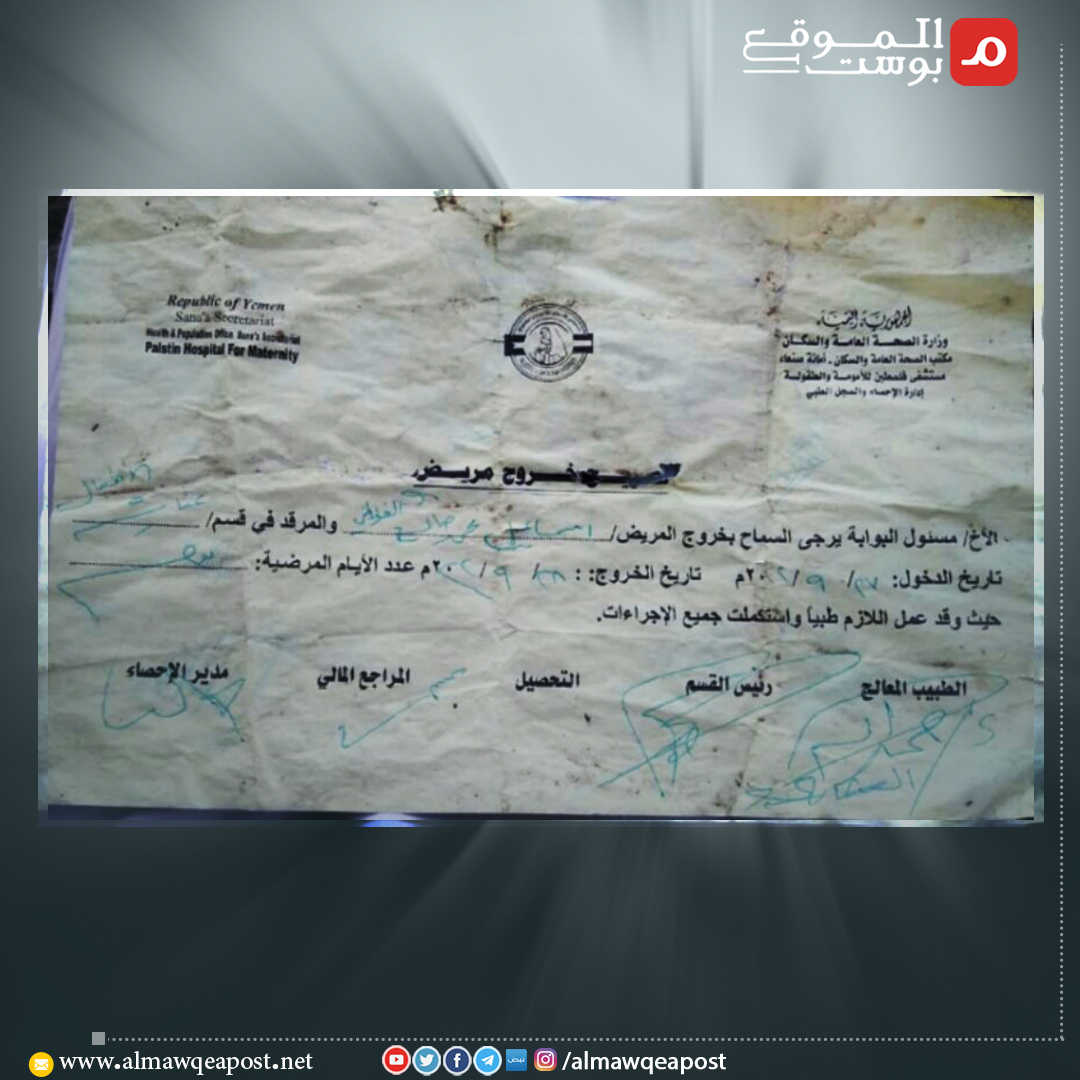
[An exit permit for a child from a hospital in Sana'a]
He continues to narrate his testimony to Al-Mawqea Post, explaining that he asked the hospital administration about the reasons for giving his child a dose of excess quantities previously used with other patients, while they replied that this was in consideration of the financial conditions experienced by the families of sick children, and that they give one dose to four children.
"They know that this medicine is very dangerous, may be exposed to any external pollution, and needing good storage. In case it is poorly stored, or exposed to heat, it turns into deadly substances and poisons, so how do they do that?” he commented on the current situation.
Serious complications
About the complications caused by these drugs in case of improper storage, a doctor specialized in pharmacies says that “Poor storage of this type of drugs causes a process of congestion and clotting, because its treatment is carried out through cotton cloth, injected through the bone marrow, and this affected patients greatly. We reached to preliminary results that the injection was improperly, with bacterial contamination”.
"It is necessary to monitor the patient after being injected with chemicals, and the patient should not leave the hospital, and in case is not monitored, it is considered as a negligence from the staff”, he added to Almawqea Post.
He pointed out that a package of medicine is not used for more than one patient, due to the pollution that may caused resulting of its opening. He also reduced talking about distributing the medicine to several patients due to the financial conditions, saying that the value of one package reaches nine thousand riyals, equivalent to only 16 dollars, according to foreign exchange rates in Sana'a.
Terrible health deterioration
A third testimony we obtained from a relative of a victim child that requested us to be anonymous for security reasons. He only indicated to Al-Mawqea Post that his child's health got deteriorated very dramatically, after taking that deadly dose, and was taken to a hospital. As per the father, his child has underwent three surgeries until the moment of writing this article, and there was no improvement in his health condition, suffering from bleeding and a clot in the brain.
Smuggled Medicine
A doctor in the Leukaemia department at Kuwait Hospital told Al-Mawqea Post that “The medicine quantities given to patients from the hospital ran out, so that they directed patients to buy it from pharmacies near to the hospital. Later, it became obvious that the same medicine the families had purchased was contaminated, expired, and entered to Yemen through smuggling.
From the above doctor’s talk, it becomes clear that the contaminated drug was available in the pharmacies, and that the patients were the ones who bought it. This also points to many conclusions, as it condemns the government agencies for bringing smuggled and contaminated drugs into the country, accusing them of complicity and not exercising their duties in monitoring the pharmaceutical market, while they cast the responsibility on the owners of pharmacies and the private sector, acquitting Kuwait Hospital and the government sector of the crime.
Moreover, the matter is still ambiguous as how do these children victims fall at a similar time, after taking the same medicine, and is it reasonable that everyone went to pharmacies at once to buy medicine. At the same time, Dr. Al-Hadi’s talk revealed about the hospital’s contribution to this disaster, through letting medicine stock to run out of stores, failing in asking families of patients to purchase such sensitive medicines for cancer themselves, without the supervision of their specialized doctors.
Smuggling as the invisible killer
Any ways, this was the first thread that leads to the causes details of the rapid killing of these children, and according to those we listened to, it is a smuggled, expired, and polluted drug at the same time. How did this drug spread in the Yemeni market, who allowed its entrance, facilitated its circulating and presenting in pharmacies?
According to the Yemeni law, the Supreme Authority for Medicines- a financially and administratively independent governmental institution affiliated with the Ministry of Health- is the only agency authorized to monitor medicines, both locally manufactured or externally imported. It is also responsible for allowing or refusing to import any foreign medicine, and does not authorize its entry into Yemen unless got examined, ensuring that it complies with the pharmaceutical standards and the applicable Yemeni specifications and standards.
The smuggling of medicines in Yemen remained a troubling issue, a thriving trade rebounded from time to time, while the government authorities were unable to curb, due to the dangerous lobby and its influential people standing behind, taking advantage of the same legal flaw that imposed lenient penalties on the smuggling process. The Yemeni law, which criminalizes drug smuggling, almost non-existent application, punishes smugglers with imprisonment for a period not exceeding three years, or a fine of no less than (30%) and not more than (50%) of the value of the substance, with the confiscation of the smuggled goods. In case of repetition, the penalty shall be doubled, except that of medicine brought for personal use purposes.
Paragraph (b) of the same law states, “Anyone who tampers with the quality of medicines, such as fraud and counterfeiting, shall be punished with imprisonment for a period not exceeding three years or a fine not exceeding three million riyals, along with confiscating and destroying the fraudulent and counterfeit goods. In case of repetition, the penalty shall be doubled.” While article No. (4) Paragraph (g) say that the Supreme Authority for Medicines should “register local and imported medicines, grant licenses for their circulation, and monitor drug stores and pharmacies.”
Almawqea Post obtained a circular issued by the Supreme Authority for Medicines directed to heads of bodies, general directors of health offices in the governorates, doctors and pharmacists, directors of hospitals and public and private health centers, and medical professionals, signed by the head of the Authority, Dr. Muhammad Abdullah Al-Ghaili, No. 24504, dated Rabi’ Al-Awwal 8, 1444 AH, meeting September 4, 2022, that includes the non-use of batches of the brand (METHOTRAXTE 50 MG/2ML) manufactured by the Indian company (CELON), whose operations are shown in numbers:
(MT12032BAQ - MT12135BAQ - MT12101BAQ - MT12108BAQ ), the circular did not specify the reasons for that ban, and whether it was harmful, expired, polluted, had complications, or proved useless.
The date of the government circular indicates that it was addressed to hospitals and pharmacies approximately twenty days before the mass death of the children. This circular, devoid of any details about the reasons for the ban, reflects that the authorities were aware that the drug was available in the market, and did not take any action to confiscate it and prevent its circulation.
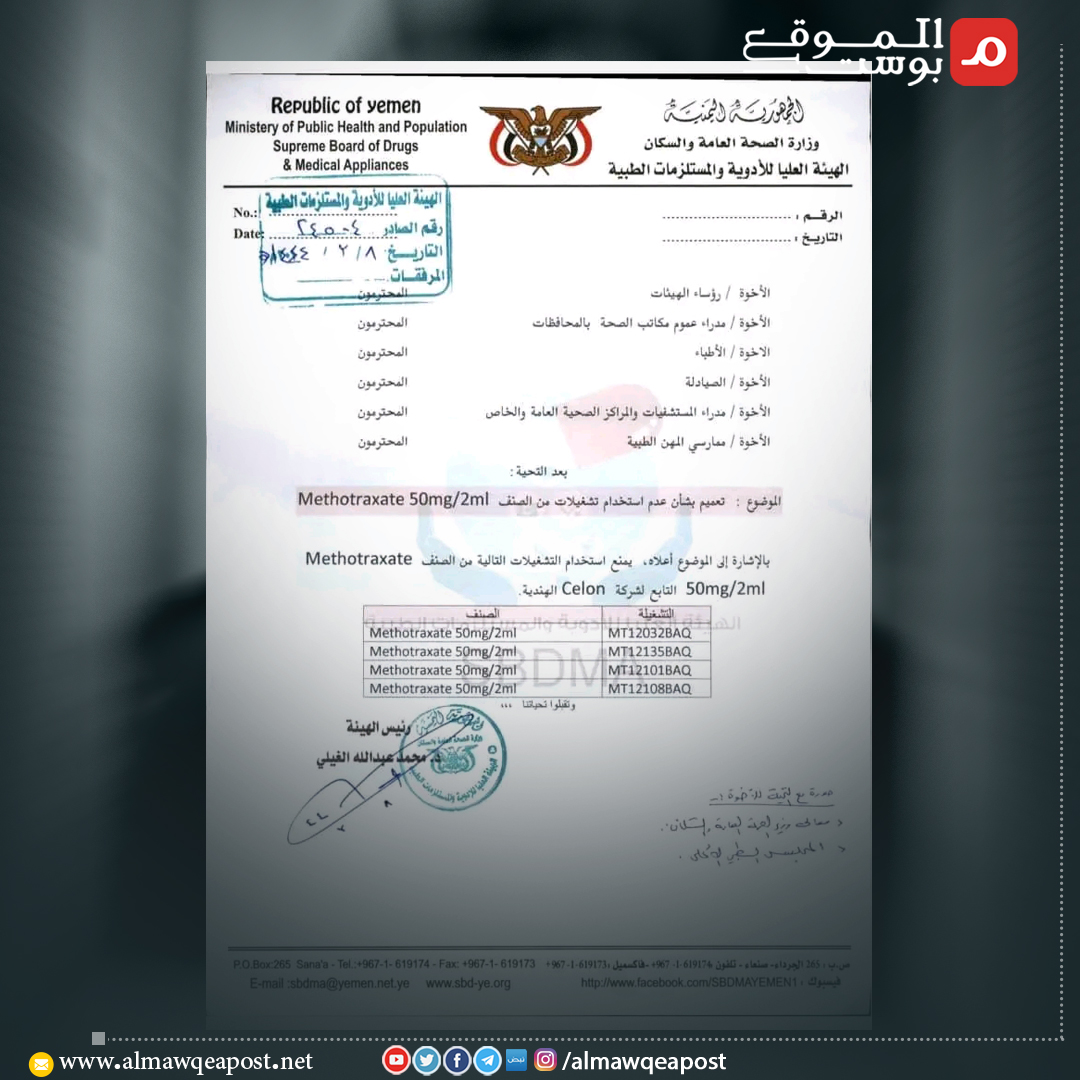
[A circular issued by the Supreme Authority for Medicines]
The responsibility of the Medicines Authority and the Ministry of Health
A senior source in the Yemeni Physicians and Pharmacists Syndicate told Al-Mawqea Post- preferred not to be named- that the main official responsible for drug smuggling is the Supreme Authority for Medicines and the Ministry of Health, as they are responsible for controlling medicines and the way to get entered, and they are the ones who approve and certify them after conducting examinations in accordance with Yemeni law.
“If the Authority did not know about this drug, why did it direct a circular boycotting the product, along with its photos, barcode, which means that they are aware of that and involved in entering these medicines”, He added, after reading the authority’s circular.
In his speech, the official at the syndicate referred to another aspect of the issue, revealed about medicines that provided by international organizations to the Ministry of Health with expiration date is nearing expiry, due to their low-priced tender, while the ministry distributes them to hospitals, gives to patients.
He continued, revealing about the gangs that purchase medicines of unknown origin, provide them to the Ministry of Health. This work is practiced by several organizations with entities in the Ministry of Health, evading from the consequences of the Procurement and Tenders Law, that is violated under the justification of being falling under the siege. According to his above statement, he referred to the allegations of Sanaa Government run by the Houthi group, and its talking of being suffering from an external blockade imposed by Saudi Arabia, that has militarily intervened in Yemen since March 2015.
"These people do not apply any law, but rather work on their own interests. They make laws that do not exist, trampling on official laws with their feet. This is a natural matter that is not surprising by a group that does not recognize any law”, the syndicate member commented on such a situation.
Black smuggling network
After extensive tracking and investigation by the Almawqea Post with several parties in search of who stands behind the distribution of such medicines, we obtained information from a pharmacist related to the drug market in Yemen, refer to him with the symbol (L.H), at his request to remain as anonymous, in order to save his life.
This pharmacist reveals what he describes as a large deal of these medicines, which were smuggled into Yemen by a person who engages in smuggling for the benefit of a businessman that works as an agent for Indian companies in Yemen, including the company responsible for manufacturing the medicine that was given to the victims’ children.
"This company did not enter the blacklist of suspicious medicines, due to the strength of the owner of the companies, the new and only agent that registers his companies with their brands within weeks without any opposition. This trader is one of the dozens recognized by the Ministry of Health and the Supreme Authority for Medicines, becoming the official authority in everything related to the import, sale and distribution of medicine in all Yemeni provinces”, he commented.
The Ministry of Health is hiding the crime
In order to investigate more precisely about the matter, we put our questions to a pharmacist who works as a member of the Syndicate of Pharmacists Owners, and we reserve his name according to his request, and refer to him with the symbol (F. i). He confirmed that the medicine given to children enters Yemen through smuggling, and that the Ministry of Health is aware of that. They agreed to import it, as they were able to determine the brand and the operating number on it before the crime occurred. He cites the validity of his words in the circular issued by the Supreme Authority for Medicines.
The pharmacist comments on what happened, considering that the Ministry of Health is trying to hide its involvement in the process through the weakest link in the case, so that it has arrested some sellers from the owners of pharmacies, and did not arrest the distributor and agent who sold these drugs to pharmacies.
He pointed out that the person who introduced this medicinal category to Yemen is the only dealer and agent for a large number of medicines, called "YY" - Almawqea Post reserved the full name- indicating that this person has a close relationship with the Ministry of Health and the General Authority for Medicines. He described him as "a mafia that trades people's lives through these drugs."
Secrecy and shocking information
We contacted the administration of the Supreme Authority for Medicines in Sana'a along with the Ministry of Health to ask the inquiries that we are looking for within this investigation, but evasion and difficulty in reaching were the result with every person we try to reach. After strenuous efforts, we contacted Dr. Anis Al-Asbahi, the spokesman for the Ministry of Health in Sana'a.
At first, Al-Asbahi refused to answer about the party responsible for this crime, arguing that he was not authorized to disclose this case, but he only said that the Ministry of Health had formed a committee to investigate, and that the Supreme Authority for Medicines possesses all evidences, and will explain all procedures during a press conference scheduled to be held in the coming days.
After many vigorous attempts to ask him about the nature of the measures taken by the Ministry of Health, the results of the preliminary investigations, Al-Asbahi revealed to Al-Mawqea Post that the treatments the Ministry had taken on this issue, until the moment of writing this article.
Al-Asbahi said that the Ministry of Health formed a committee of senior consultants, oncologists, and pharmacists specializing in pharmacology after receiving complaints from Kuwait Hospital about complications that appeared in multiple cases on children who took those lethal doses.
"After studying a sample of those packages that were given to sick children, it was found that the medicine used was contaminated as a result of poor storage, because these particular materials need certain storage methods, such as not being exposed to light, the need to be kept in the refrigerator, and away from sunlight. It requires many conditions to be stored well, and in the case of improper storage, the materials may turn into toxic”, he added.
Al-Asbahi did not comment on the measures taken against the importers and distributors of this drug, but he indicated that the ministry had begun field trips, closed the pharmacies that sold the medicine to patients, despite the confirmation of some of the victims’ parents that the medicine was dispensed to them by the hospital administration.
But the most important and most dangerous information that Al-Asbahi disclosed was the most shocking. By asking him about the dealer responsible for introducing this drug category to Yemen, he stated that the company that manufactured the drug was contacted to find out its agent in Yemen, and it was found that there is no agent for it in Yemen.
The Houthi group dealing
Since the news spread of the death of children in Sanaa, voices began to rise about the causes of this disaster, and to know the details that led to. The Houthi group did not move a finger towards the issue, which took many dimensions, shed light on the health situation in the Houthi-controlled areas.
On the thirteenth of this October, the Ministry of Public Health and Population in the government of the Houthi group (not recognized internationally) announced the death of ten children with blood tumors, due to the ministry's inability to secure vital medicines.
The group attributed the reasons for the delay in the entry of these medicines from the ports under the control of what it described as the countries of aggression, in reference to the Saudi-led military coalition in Yemen, and accused it of preventing the entry of vital medicines for Leukaemia diseases.
The ministry statement said that the results of the investigations revealed the presence of bacterial contamination in the packages of the used medicine, specifically the batch that was smuggled, according to the examination results of the pharmaceutical laboratory at the Supreme Authority for Medicines, and that the competent authorities are tracking the way the drug entered Yemen. It added that they transmitted the case file and the final report to the Public Prosecution Office to complete the investigation, and to take deterrent legal measures.
The Ministry pointed out that the report of the formed committee confirmed that nineteen children with Leukaemia, between the ages of 3 and 15 years, experienced complications after receiving a drug that was smuggled to a private pharmacy. It added that the smuggled batch of the drug used did not pass through the procedures of the Supreme Authority for Medicines, or the tenders of National Cancer Center.
It is clear in the statement of the Ministry of Health that it has casted the accusation at the hands of foreigners, and that it has admitted the existence of a crime that occurred within the scope of its service work, its specialized agencies. But it fell into contradiction when it attributed the reason to the coalition entry preventing of medicine into Yemen, and at the same time it acknowledged the existence of smuggling of medicine into the country.
This raises the question of how the smuggled drug reached Sana’a, the parties behind it, the failure of the security and control system to perform its tasks, and the apparent failure to facilitate its access, promotion, sale, and dispensing to patients.
Information about the manufacturer
.This drug is produced by an Indian company called (CELON LABS), headquartered in the city of Hyderabad, India, which is specialized in developing drugs for oncology and critical care
This company is considered to be the preferred supplier to government agencies in India for this sample of drugs, and has a presence in emerging markets in Africa, Southeast Asia and Latin America. It has agents in the region such as Lebanon, represented by the Mediterranean Pharmaceutical Company and Jamiclo Pharma Company.
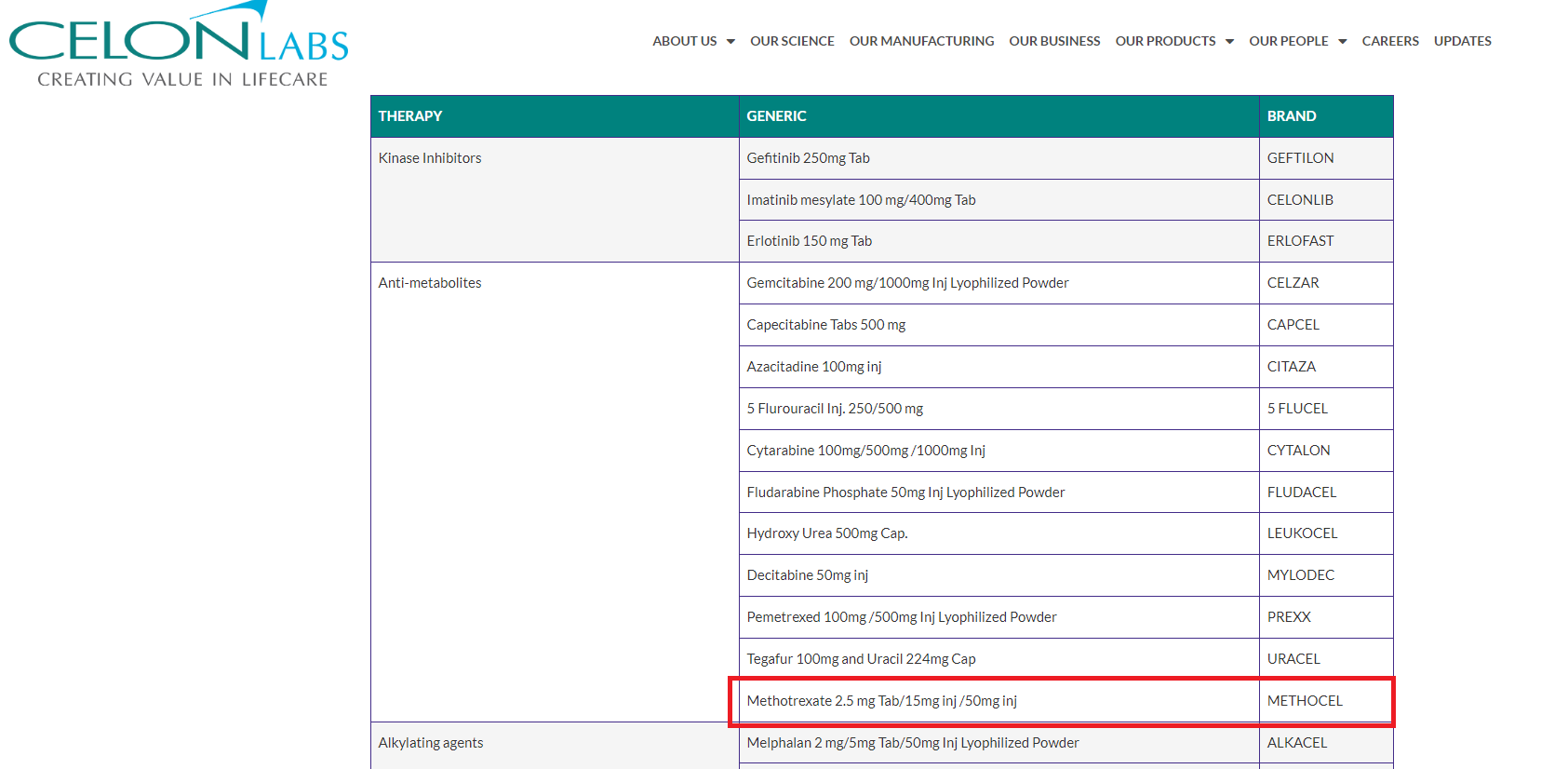
[The company manufactured medicine displayed at the Indian company]
According to its website, the company said that it has the best infrastructure in India, a modern research and development centre that complies with the most stringent CGMP standards, that is recognized by the Government of India, is engaged in creating high quality formulations. It added that they focus on getting the best products at the best possible process for its manufacturing, that fits with pharmaceutical compliance and regulatory standards.
By browsing the medicines produced by the company on its website, it becomes clear that it is in the list of the main medicines, and it is classified under the anti-metabolic name (Methotrexate 2.5 mg Tab/15mg inj /50mg inj) and within the classification of (Anti-metabolites), and the (METHOCEL) brand.
It is also clear that the drug is one of the company's main products, widely promoted, and the company says that it has helped a large number of cancer patients to recover for long periods, live better, and that the company efforts in hematology resulted in the launch of the first bone marrow in India.
It is also noted that several Indian websites promote this product on the Internet, allow the possibility of communicating with them, for those who wish to become their own trading agent, or purchase the product online.
What is the medicine?
Methotrexate is a class of tablets that are round, biconvex on both sides. It acts as an antagonist of folic acid, classified as an anti-metabolic cytotoxic factor that used as a treatment for cancerous tumors, including acute Leukaemia, lymphoma, and sarcomas of soft tissue and bone of origin, solid tumors, especially breast, lung, head and neck, bladder, cervix, ovary, and testicle, as well as in the treatment of severe uncontrolled psoriasis that does not respond to conventional treatment.
The drug is used orally, and the one who prescribes it is required to specify the day of its intake and must be taken once a week. Methotrexate should only be prescribed by doctors with experience in its use, and a full understanding of the risks involved.
Warnings when using the medicine
Through the process of investigation, we found that many countries have research available on the Internet, specialized in medicines, explaining drug interactions, symptoms and all related studies, including this drug, which many specialized pharmaceutical and medical sites provide many tips about its usage, dealing, and its symptoms.
The (Drugs) site, specialized in medicines, advises the importance of storing Methotrexate in the refrigerator away from moisture, heat and light. It stresses on the importance of avoiding freezing or high heat, and not to be used after sixty days in case of being kept at room temperature.
As for the British website (Medicines), specializes in drugs, it advises dealing with this drug category by trained personnel, and the importance of wearing gloves, protective glasses to avoid accidentally contacting the drug with the skin or eyes.
The (Medicines) website stresses on the importance of monitoring the patient who uses the drug during and after treatment, until signs, toxic symptoms, or negative reactions are detected and evaluated as soon as possible, while this is missing in the treatment of the health authorities in Sana’a with patients, according to the testimonies of the victims’ families.
From the Editor:
In this investigation, we sought to highlight the point views of the various parties, in a case that is one of the most serious issues related to human health, and that constitutes a scandal and a crime by all standards. We reserve the right to mention many names, in order to preserve lives of those who provided the information contained in this article.
We also want to attract attentions that we have sent many inquiries to the Indian company hopping to obtain return information about its product, the nature of its presence in Yemen. If we obtained any answers, they will be published on our website.
تتوفر المادة باللغة العربية ويمكن قرائتها بالنقر على الرابط
